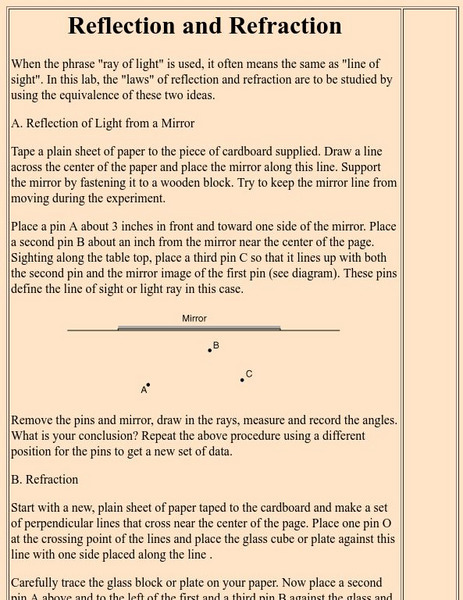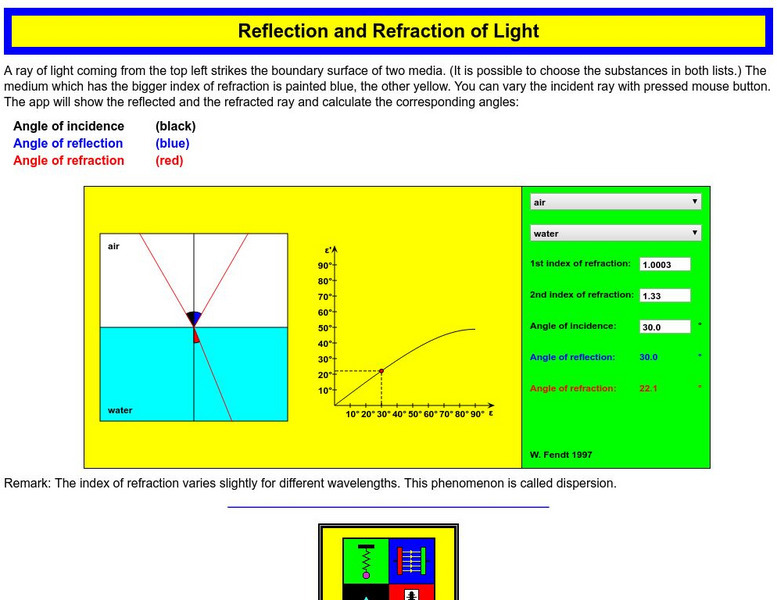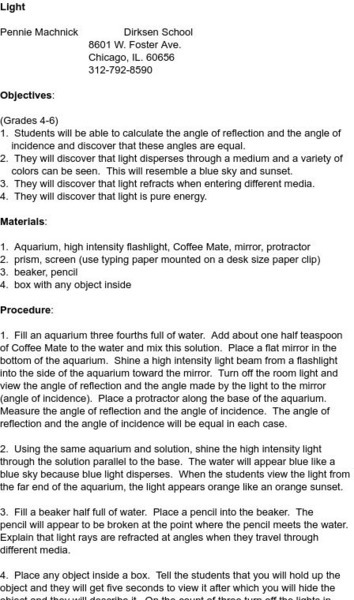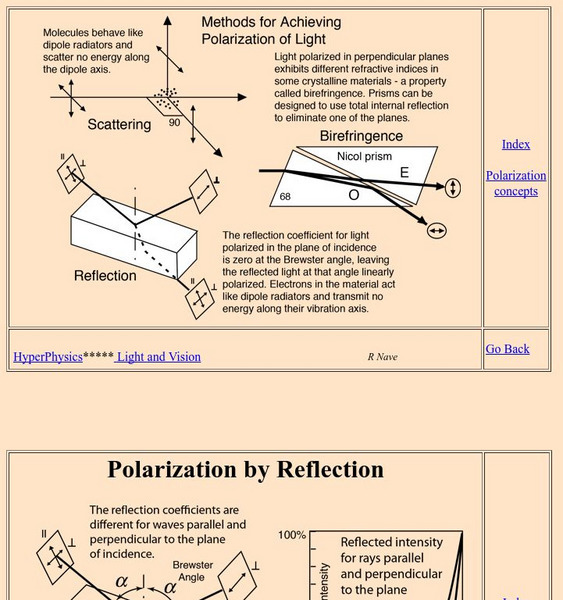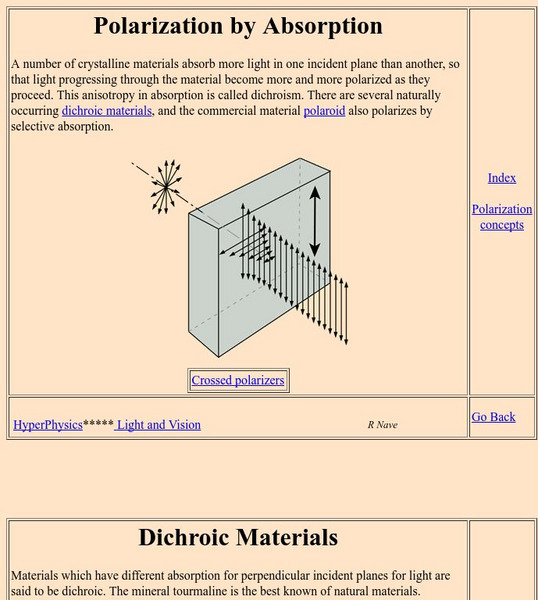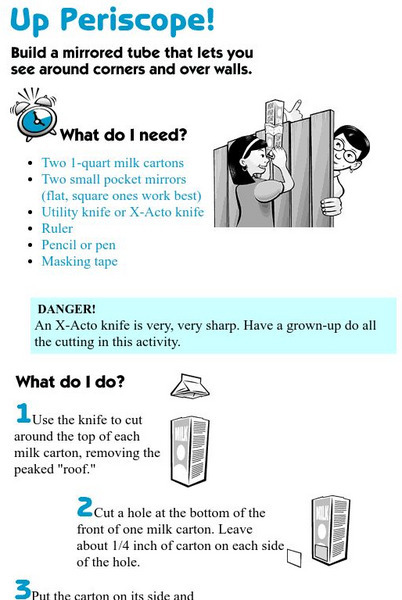Teachers TryScience
Teachers Try Science: Where There's Light, There's Hot Food!!!
This unit helps young scholars learn to apply the concept of solar energy conservation. They are introduced to angles and their effect on the amount of light reflected, and they will also design, construct, manipulate, critique, evaluate...
Georgia State University
Georgia State University: Hyper Physics: Crossed Polarizers
At this univeristy physics department site, the polarization of light is explained and illustrated. Methods for analyzing light to determine the degree of polarization are stated and explained with equations.
University of Minnesota
University of Minnesota: How Does Light Travel?
Contains a four step procedure to deriving the law of reflection using algebra, Fermat's principle, and calculus (simple derivatives). This is good for an in-class theoretical exercise.
Georgia State University
Georgia State University: Hyper Physics: Total Internal Reflection
This physics department site provides a definition and explanation of the phenomenon of total internal reflection. Includes a diagram and an equation for calculating the critical angle for light approaching a surface.
University of Minnesota
University of Minnesota: Refraction of Light
This page is a continuation of a tutorial about light reflection and refraction. It contains a diagram and suggestions on how to derive Snell's Law, which governs the refraction of light in a medium. For background to this derivation,...
BBC
Bbc: Gcse Bitesize: Why Do Scientists Think That Light and Sound Are Waves?
Light travels as transverse waves and can travel through a vacuum. Sound travels as longitudinal waves and needs to travel through a solid, liquid or gas. Read about the properties of light and of sound, and learn the differences between...
CK-12 Foundation
Ck 12: Plix: Law of Reflection: Angle of Incidence
[Free Registration/Login Required] In the scenario shown here, the laser cannot shine through the black barrier but can hit all three targets by reflecting off of the floor. Use the red dot to change the angle of the laser generator and...
Physics Classroom
The Physics Classroom: Refraction and Ray Model of Light: Boundary Behavior
In this illustrated physics tutorial, students investigate the connection between light reflection and light refraction.
CK-12 Foundation
Ck 12: Total Internal Reflection
[Free Registration/Login may be required to access all resource tools.] Students learn about total internal reflection. More specifically, they will learn what the critical angle is, how it is derived and how to solve for it in real life...
Georgia State University
Georgia State University: Hyper Physics: Reflection and Refraction
Reflection and refraction are explained with an experiment that uses a sheet of paper, cardboard, and other common materials.
Walter Fendt
Walter Fendt: Reflection and Refraction of Light
Defines the refraction of light and provides an applet for investigating it.
Physics Classroom
The Physics Classroom: Reflection and Ray Model of Light: Right Angle Mirrors
Discover how light reacts when it strikes mirrors which are placed at right angles to each other.
Science and Mathematics Initiative for Learning Enhancement (SMILE)
Smile: Light
For this activity, students actually find the angles of reflection and incidence.
CK-12 Foundation
Ck 12: Plix: Wave Interactions: Law of Reflection
[Free Registration/Login Required] Move the light source to see what happens to the reflected ray as you change the angle of the incident ray.
Georgia State University
Georgia State University: Hyper Physics: Methods of Polarization
At this college physics department site, the polarization of light is explained and illustrated as well as the primary methods of polarization (scattering, reflection, and refraction).
TeachEngineering
Teach Engineering: When Silicon Talks
In this activity, students tackle this aspect of engineering as they solve problems for precise angles and speeds, and predict data output when samples are altered.
Optical Society
Optical Society of America: Optics for Kids: Total Internal Reflection
An investigation into the total internal reflection of light, using a laser pointer. Accompanied by an explanation of what's happening, a discussion of Snell's Law, and links to additional information.
Texas Instruments
Texas Instruments: Finding the Shortest Path
Students discover the shortest distance light travels from an object to the human eye, as the light from the object reflects off a single mirror. In the process they learn about reflection in a line, congruent angles, angle bisectors,...
CK-12 Foundation
Ck 12: Physical Science: Refraction
[Free Registration/Login may be required to access all resource tools.] Refraction of light in matter and how light changes its speed and angle of refraction according to the type of medium it is travelling through.
Exploratorium
Exploratorium: Bubbularium
What colors do you see in a bubble? Why do you see colors in a bubble? Use this site to find out the answer to these questions with this easy experiment.
Optical Society
Optical Society of America: Optics for Kids: Mirrors and Images
An experiment to investigate how many images appear as the angle between two hinged mirrors is increased. Accompanied by an explanation of what is happening, questions for students to consider, and a link to an article about reflection.
Boston University
Bu: Optics: Geometric Optics
Several short descriptions of demonstrations which illustrate principles of geometric optics (many of which focus upon refraction).
Georgia State University
Georgia State University: Hyper Physics: Polarization by Absorption
The operation of Polaroid filters on a pair of sunglasses is shown.
Exploratorium
Exploratorium: Up Periscope!
Children can look around corners with this homemade periscope. Great instructions at this Exploratorium site on how to build a periscope.











